Unit 9 Have you ever been to a museum? 单元讲义+练习(含解析) 2023-2024学年人教版英语八年级下册
文档属性
| 名称 | Unit 9 Have you ever been to a museum? 单元讲义+练习(含解析) 2023-2024学年人教版英语八年级下册 |
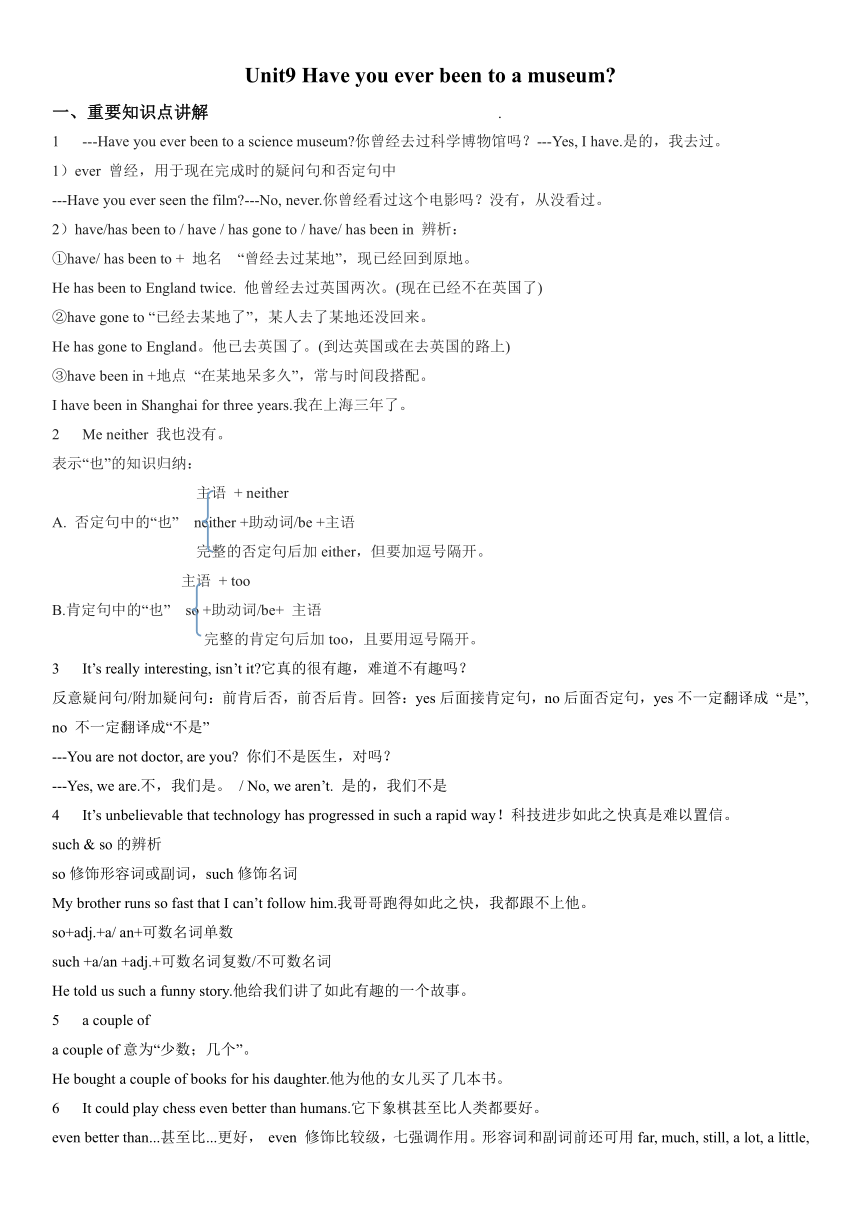
|
|
| 格式 | docx | ||
| 文件大小 | 40.3KB | ||
| 资源类型 | 教案 | ||
| 版本资源 | 人教新目标(Go for it)版 | ||
| 科目 | 英语 | ||
| 更新时间 | 2024-05-09 10:17:31 | ||
图片预览

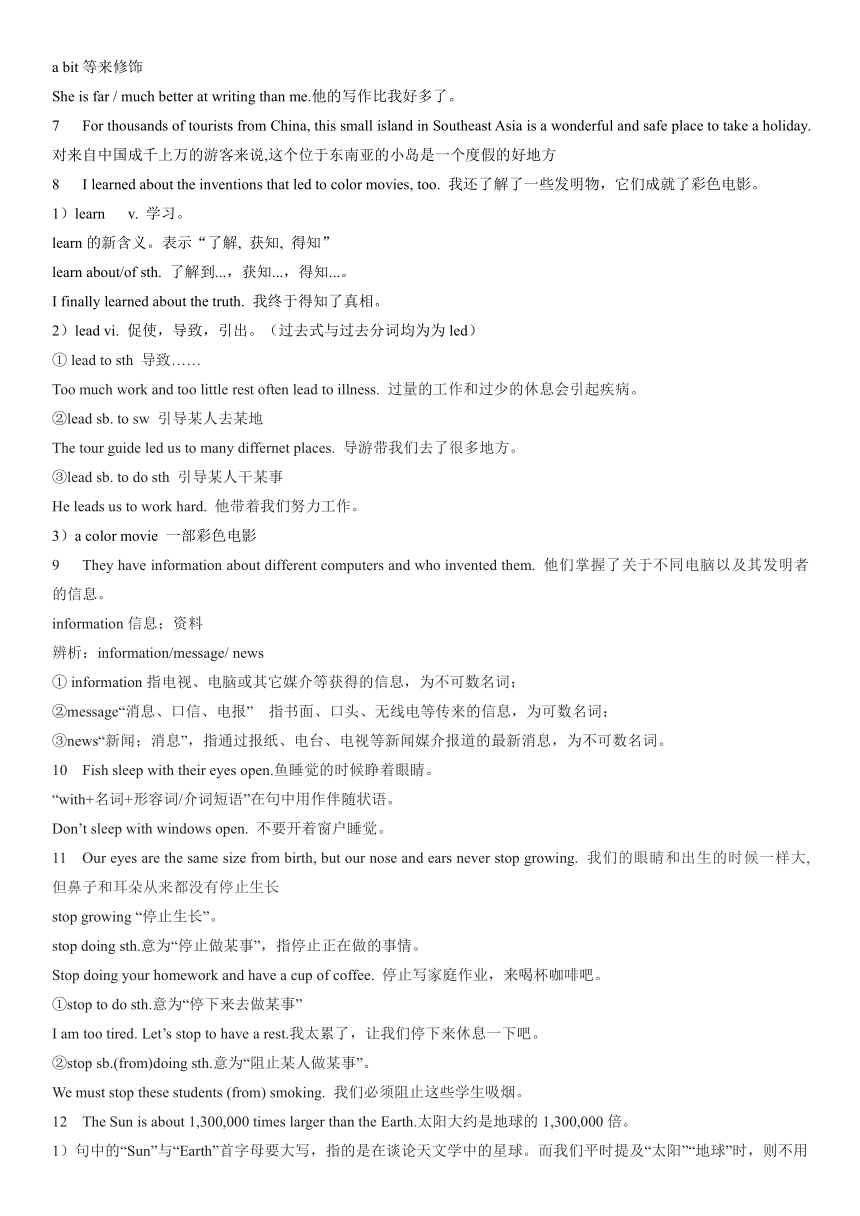
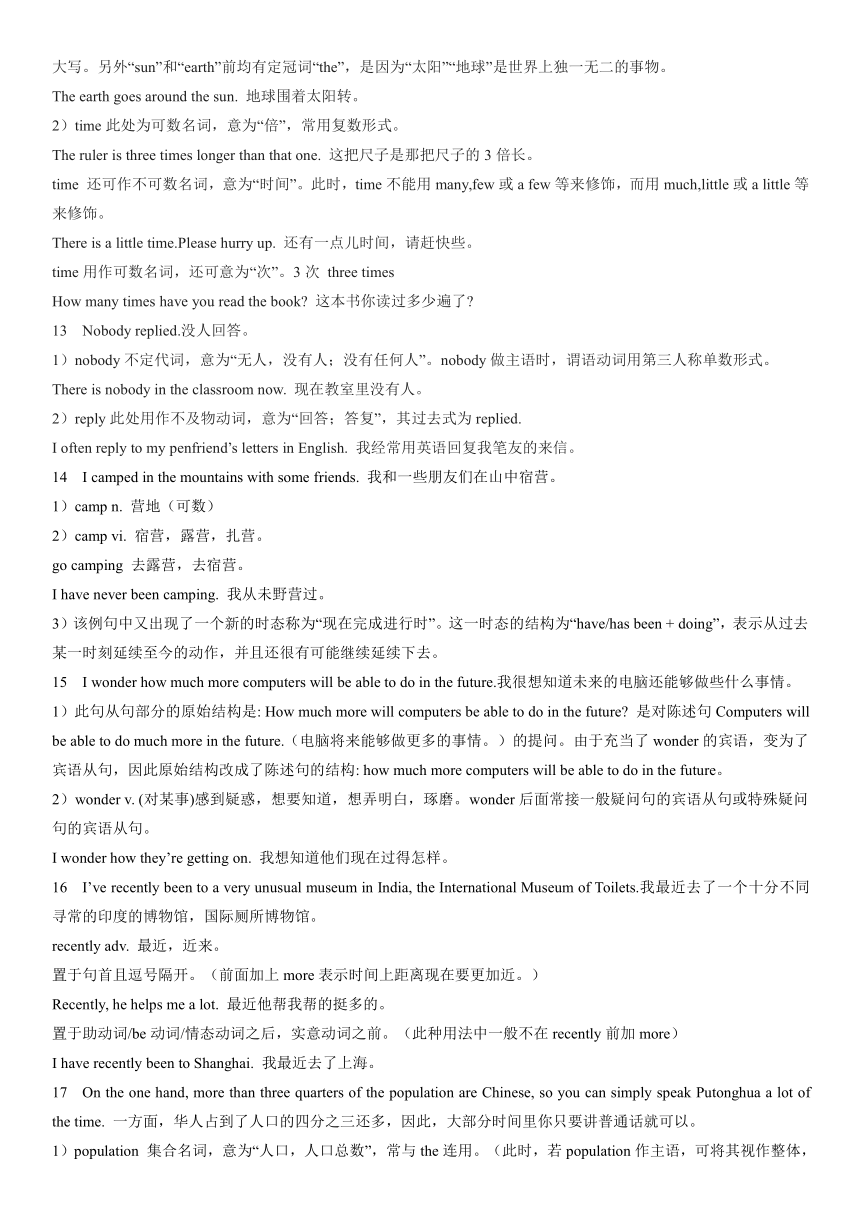
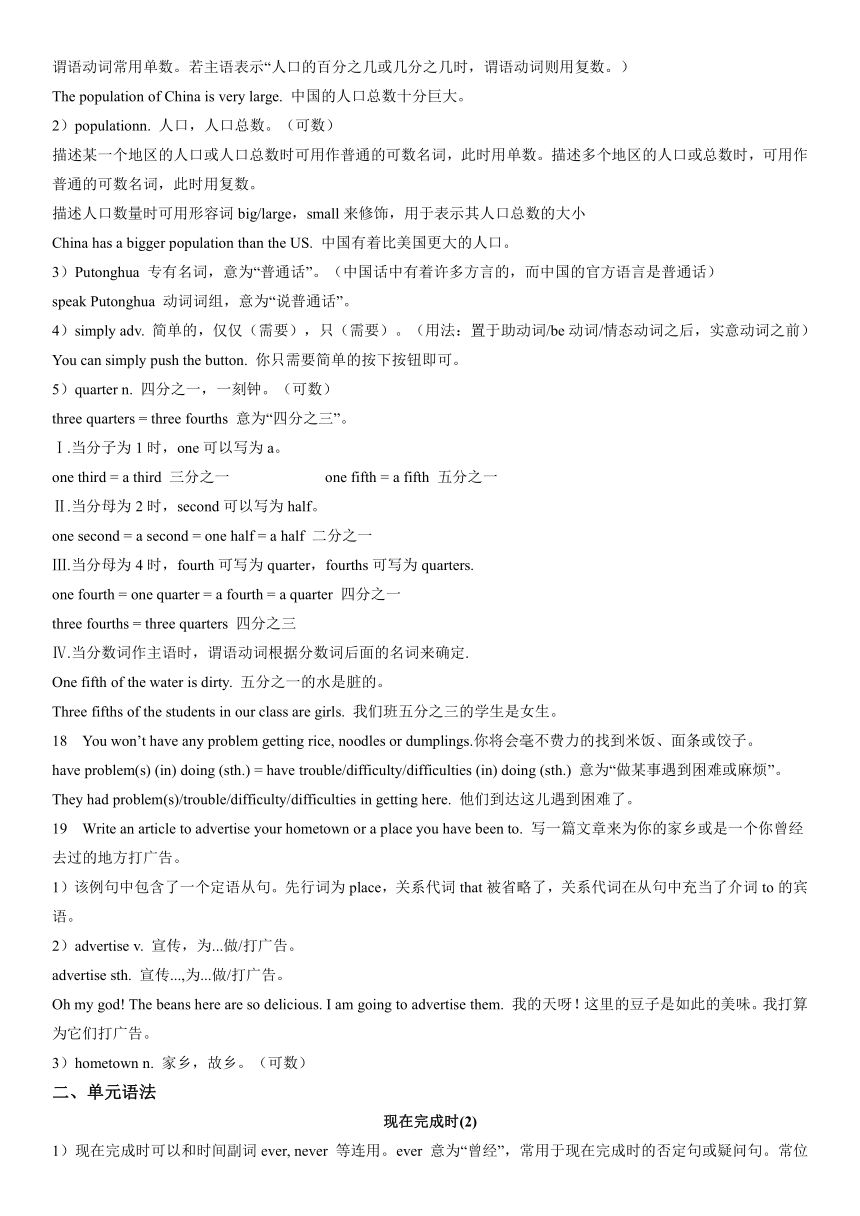
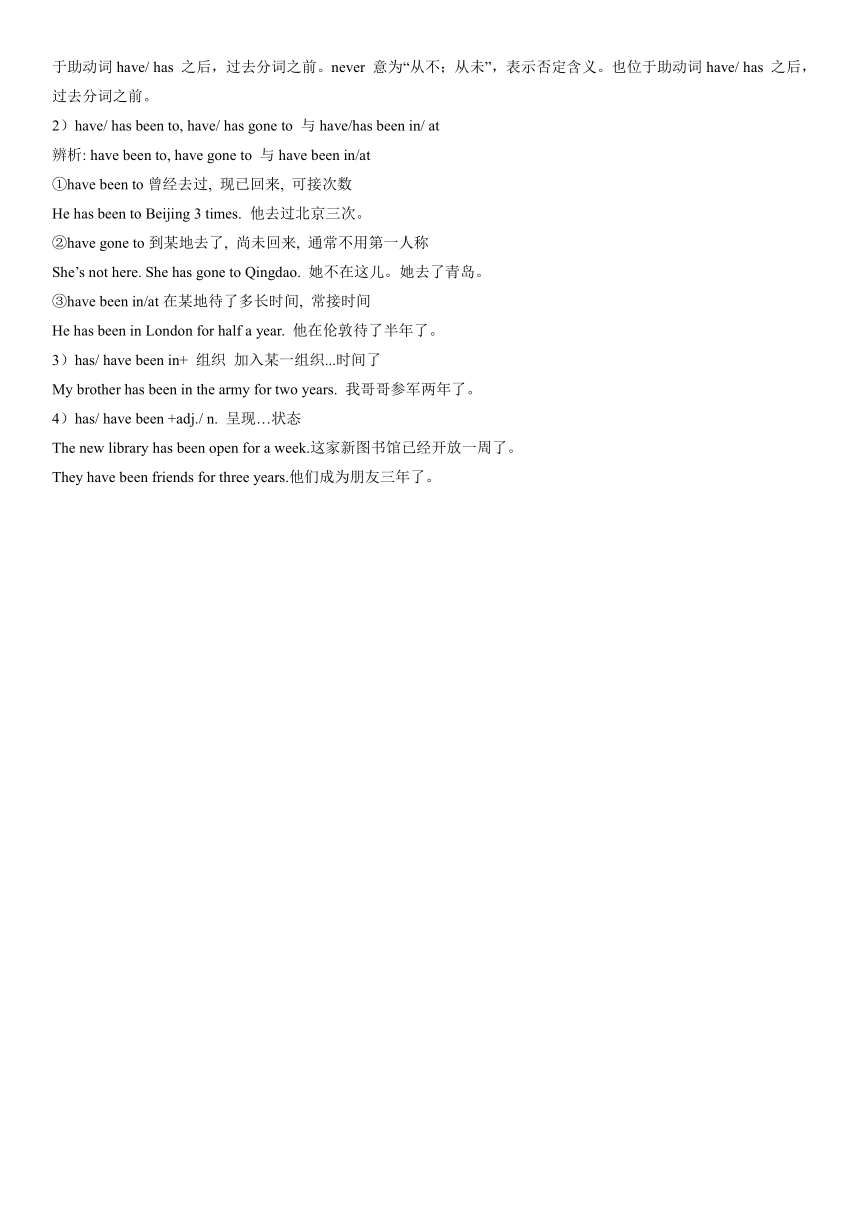
文档简介
Unit9 Have you ever been to a museum
一、重要知识点讲解 .?
1 ---Have you ever been to a science museum 你曾经去过科学博物馆吗?---Yes, I have.是的,我去过。
1)ever 曾经,用于现在完成时的疑问句和否定句中
---Have you ever seen the film ---No, never.你曾经看过这个电影吗?没有,从没看过。
2)have/has been to / have / has gone to / have/ has been in 辨析:
①have/ has been to + 地名 “曾经去过某地”,现已经回到原地。
He has been to England twice. 他曾经去过英国两次。(现在已经不在英国了)
②have gone to “已经去某地了”,某人去了某地还没回来。
He has gone to England。他已去英国了。(到达英国或在去英国的路上)
③have been in +地点 “在某地呆多久”,常与时间段搭配。
I have been in Shanghai for three years.我在上海三年了。
2 Me neither 我也没有。
表示“也”的知识归纳:
主语 + neither
A. 否定句中的“也” neither +助动词/be +主语
完整的否定句后加either,但要加逗号隔开。
主语 + too
B.肯定句中的“也” so +助动词/be+ 主语
完整的肯定句后加too,且要用逗号隔开。
3 It’s really interesting, isn’t it 它真的很有趣,难道不有趣吗?
反意疑问句/附加疑问句:前肯后否,前否后肯。回答:yes后面接肯定句,no后面否定句,yes不一定翻译成 “是”, no 不一定翻译成“不是”
---You are not doctor, are you 你们不是医生,对吗?
---Yes, we are.不,我们是。 / No, we aren’t. 是的,我们不是
4 It’s unbelievable that technology has progressed in such a rapid way!科技进步如此之快真是难以置信。
such & so的辨析
so修饰形容词或副词,such修饰名词
My brother runs so fast that I can’t follow him.我哥哥跑得如此之快,我都跟不上他。
so+adj.+a/ an+可数名词单数
such +a/an +adj.+可数名词复数/不可数名词
He told us such a funny story.他给我们讲了如此有趣的一个故事。
5 a couple of
a couple of意为“少数;几个”。
He bought a couple of books for his daughter.他为他的女儿买了几本书。
6 It could play chess even better than humans.它下象棋甚至比人类都要好。
even better than...甚至比...更好, even 修饰比较级,七强调作用。形容词和副词前还可用far, much, still, a lot, a little, a bit等来修饰
She is far / much better at writing than me.他的写作比我好多了。
7 For thousands of tourists from China, this small island in Southeast Asia is a wonderful and safe place to take a holiday.对来自中国成千上万的游客来说,这个位于东南亚的小岛是一个度假的好地方
8 I learned about the inventions that led to color movies, too. 我还了解了一些发明物,它们成就了彩色电影。
1)learn v. 学习。
learn的新含义。表示“了解, 获知, 得知”
learn about/of sth. 了解到...,获知...,得知...。
I finally learned about the truth. 我终于得知了真相。
2)lead vi. 促使,导致,引出。(过去式与过去分词均为为led)
① lead to sth 导致……
Too much work and too little rest often lead to illness. 过量的工作和过少的休息会引起疾病。
②lead sb. to sw 引导某人去某地
The tour guide led us to many differnet places. 导游带我们去了很多地方。
③lead sb. to do sth 引导某人干某事
He leads us to work hard. 他带着我们努力工作。
3)a color movie 一部彩色电影
9 They have information about different computers and who invented them. 他们掌握了关于不同电脑以及其发明者的信息。
information信息;资料
辨析:information/message/ news
① information指电视、电脑或其它媒介等获得的信息,为不可数名词;
②message“消息、口信、电报” 指书面、口头、无线电等传来的信息,为可数名词;
③news“新闻;消息”,指通过报纸、电台、电视等新闻媒介报道的最新消息,为不可数名词。
10 Fish sleep with their eyes open.鱼睡觉的时候睁着眼睛。
“with+名词+形容词/介词短语”在句中用作伴随状语。
Don’t sleep with windows open. 不要开着窗户睡觉。
11 Our eyes are the same size from birth, but our nose and ears never stop growing. 我们的眼睛和出生的时候一样大,但鼻子和耳朵从来都没有停止生长
stop growing “停止生长”。
stop doing sth.意为“停止做某事”,指停止正在做的事情。
Stop doing your homework and have a cup of coffee. 停止写家庭作业,来喝杯咖啡吧。
①stop to do sth.意为“停下来去做某事”
I am too tired. Let’s stop to have a rest.我太累了,让我们停下来休息一下吧。
②stop sb.(from)doing sth.意为“阻止某人做某事”。
We must stop these students (from) smoking. 我们必须阻止这些学生吸烟。
12 The Sun is about 1,300,000 times larger than the Earth.太阳大约是地球的1,300,000倍。
1)句中的“Sun”与“Earth”首字母要大写,指的是在谈论天文学中的星球。而我们平时提及“太阳”“地球”时,则不用大写。另外“sun”和“earth”前均有定冠词“the”,是因为“太阳”“地球”是世界上独一无二的事物。
The earth goes around the sun. 地球围着太阳转。
2)time此处为可数名词,意为“倍”,常用复数形式。
The ruler is three times longer than that one. 这把尺子是那把尺子的3倍长。
time 还可作不可数名词,意为“时间”。此时,time不能用many,few或a few等来修饰,而用much,little或a little等来修饰。
There is a little time.Please hurry up. 还有一点儿时间,请赶快些。
time用作可数名词,还可意为“次”。3次 three times
How many times have you read the book 这本书你读过多少遍了
13 Nobody replied.没人回答。
1)nobody不定代词,意为“无人,没有人;没有任何人”。nobody做主语时,谓语动词用第三人称单数形式。
There is nobody in the classroom now. 现在教室里没有人。
2)reply此处用作不及物动词,意为“回答;答复”,其过去式为replied.
I often reply to my penfriend’s letters in English. 我经常用英语回复我笔友的来信。
14 I camped in the mountains with some friends. 我和一些朋友们在山中宿营。
1)camp n. 营地(可数)
2)camp vi. 宿营,露营,扎营。
go camping 去露营,去宿营。
I have never been camping. 我从未野营过。
3)该例句中又出现了一个新的时态称为“现在完成进行时”。这一时态的结构为“have/has been + doing”,表示从过去某一时刻延续至今的动作,并且还很有可能继续延续下去。
15 I wonder how much more computers will be able to do in the future.我很想知道未来的电脑还能够做些什么事情。
1)此句从句部分的原始结构是: How much more will computers be able to do in the future 是对陈述句Computers will be able to do much more in the future.(电脑将来能够做更多的事情。)的提问。由于充当了wonder的宾语,变为了宾语从句,因此原始结构改成了陈述句的结构: how much more computers will be able to do in the future。
2)wonder v. (对某事)感到疑惑,想要知道,想弄明白,琢磨。wonder后面常接一般疑问句的宾语从句或特殊疑问句的宾语从句。
I wonder how they’re getting on. 我想知道他们现在过得怎样。
16 I’ve recently been to a very unusual museum in India, the International Museum of Toilets.我最近去了一个十分不同寻常的印度的博物馆,国际厕所博物馆。
recently adv. 最近,近来。
置于句首且逗号隔开。(前面加上more表示时间上距离现在要更加近。)
Recently, he helps me a lot. 最近他帮我帮的挺多的。
置于助动词/be动词/情态动词之后,实意动词之前。(此种用法中一般不在recently前加more)
I have recently been to Shanghai. 我最近去了上海。
17 On the one hand, more than three quarters of the population are Chinese, so you can simply speak Putonghua a lot of the time. 一方面,华人占到了人口的四分之三还多,因此,大部分时间里你只要讲普通话就可以。
1)population 集合名词,意为“人口,人口总数”,常与the连用。(此时,若population作主语,可将其视作整体,谓语动词常用单数。若主语表示“人口的百分之几或几分之几时,谓语动词则用复数。)
The population of China is very large. 中国的人口总数十分巨大。
2)populationn. 人口,人口总数。(可数)
描述某一个地区的人口或人口总数时可用作普通的可数名词,此时用单数。描述多个地区的人口或总数时,可用作普通的可数名词,此时用复数。
描述人口数量时可用形容词big/large,small来修饰,用于表示其人口总数的大小
China has a bigger population than the US. 中国有着比美国更大的人口。
3)Putonghua 专有名词,意为“普通话”。(中国话中有着许多方言的,而中国的官方语言是普通话)
speak Putonghua 动词词组,意为“说普通话”。
4)simply adv. 简单的,仅仅(需要),只(需要)。(用法:置于助动词/be动词/情态动词之后,实意动词之前)
You can simply push the button. 你只需要简单的按下按钮即可。
5)quarter n. 四分之一,一刻钟。(可数)
three quarters = three fourths 意为“四分之三”。
Ⅰ.当分子为1时,one可以写为a。
one third = a third 三分之一 one fifth = a fifth 五分之一
Ⅱ.当分母为2时,second可以写为half。
one second = a second = one half = a half 二分之一
Ⅲ.当分母为4时,fourth可写为quarter,fourths可写为quarters.
one fourth = one quarter = a fourth = a quarter 四分之一
three fourths = three quarters 四分之三
Ⅳ.当分数词作主语时,谓语动词根据分数词后面的名词来确定.
One fifth of the water is dirty. 五分之一的水是脏的。
Three fifths of the students in our class are girls. 我们班五分之三的学生是女生。
18 You won’t have any problem getting rice, noodles or dumplings.你将会毫不费力的找到米饭、面条或饺子。
have problem(s) (in) doing (sth.) = have trouble/difficulty/difficulties (in) doing (sth.) 意为“做某事遇到困难或麻烦”。
They had problem(s)/trouble/difficulty/difficulties in getting here. 他们到达这儿遇到困难了。
19 Write an article to advertise your hometown or a place you have been to. 写一篇文章来为你的家乡或是一个你曾经去过的地方打广告。
1)该例句中包含了一个定语从句。先行词为place,关系代词that被省略了,关系代词在从句中充当了介词to的宾语。
2)advertise v. 宣传,为...做/打广告。
advertise sth. 宣传...,为...做/打广告。
Oh my god! The beans here are so delicious. I am going to advertise them. 我的天呀!这里的豆子是如此的美味。我打算为它们打广告。
3)hometown n. 家乡,故乡。(可数)
二、单元语法
现在完成时(2)
1)现在完成时可以和时间副词ever, never 等连用。ever 意为“曾经”,常用于现在完成时的否定句或疑问句。常位于助动词have/ has 之后,过去分词之前。never 意为“从不;从未”,表示否定含义。也位于助动词have/ has 之后,过去分词之前。
2)have/ has been to, have/ has gone to 与have/has been in/ at
辨析: have been to, have gone to 与have been in/at
①have been to曾经去过, 现已回来, 可接次数
He has been to Beijing 3 times. 他去过北京三次。
②have gone to到某地去了, 尚未回来, 通常不用第一人称
She’s not here. She has gone to Qingdao. 她不在这儿。她去了青岛。
③have been in/at在某地待了多长时间, 常接时间
He has been in London for half a year. 他在伦敦待了半年了。
3)has/ have been in+ 组织 加入某一组织...时间了
My brother has been in the army for two years. 我哥哥参军两年了。
4)has/ have been +adj./ n. 呈现…状态
The new library has been open for a week.这家新图书馆已经开放一周了。
They have been friends for three years.他们成为朋友三年了。
同步练习
Ⅰ.单项选择(15)
1. —My dream is to build ________________ university on the moon some day.
—It sounds like ________________ unusual dream. I wish you could realize it.
A. a; a B. an; a C. a; an D. an; an
【答案】C
【解析】考查冠词的运用。句意:——我的梦想是有一天在月球上建一所大学。——这听起来像是一个不寻常的梦。我希望你能实现它。根据句意可知,划线处均表达为数量中的“一”所(个),需用不定冠词;university以辅音音素/j/开头,需用a;unusual以元音音素/ /开头,需用an。故选择C。
2. After hearing the scary story, the little kid hid behind the door and shook with _______________.
A. stress B. surprise C. laughter D. fear
【答案】D
【解析】考查名词词义辨析。句意:听到可怕的故事后,小男孩躲在门后,吓得发抖。stress 意为:压力;surprise意为:惊讶;laughter意为:笑声;fear意为:害怕。shake意为:颤抖;shake with fear意为:恐惧得发抖。根据句意可知,选D。
3. Nick got an A in the math test. His parents were happy and said he _______________ a lot.
A. competed B. laughed C. communicated D. progressed
【答案】D
【解析】考查动词词义辨析。句意:尼克在数学考试中得了个A。他的父母很高兴,说他进步很多。competed竞争;laughed笑;communicated沟通;progressed进步。根据句意可知,ABC均与句意不合,选D。
4. —Do you know Mr. Brown well
—No, I have never met him. I _____________ heard about him.
A. suddenly B. mostly C. simply D. clearly
【答案】C
【解析】考查副词词义辨析。句意:——你很了解布朗先生吗?——不,我从没见过他,我仅仅听说过他。
suddenly意为:突然地;mostly意为:大部分;simply意为:仅仅;clearly意为:清楚地。根据句意可知,B仅仅听说过布朗先生,选C。
5. Foxes and lions are _____________ during the night, and we can see them walking.
A. awake B. alone C. asleep D. amazing
【答案】A
【解析】考查形容词词义辨析。句意:狐狸和狮子在夜里醒着,我们可以看到它们行走。A. awake 醒着,形容词;B. alone 单独的,形容词; C. asleep睡着的,形容词;D. amazing令人惊奇的,形容词。be+形容词,表所处状态。根据and we can see them walking可知,我们可以看见它们走路,因此它们应是醒着的,故选A。
6. —How is your English study
—Not bad. But I _________________ learning English grammar.
A. am interested in B. am good at C. have trouble D. am excited about
【答案】C
【解析】考查短语词义辨析。句意:――你的英语学习怎样?――不太糟。但是我学英语语法有点苦难。am interested in意为:对……感兴趣;am good at意为:擅长;have a little trouble意为:做某事有困难;am excited about意为:对……感到兴奋。根据句意可知,选C。
7. ________________ you like swimming, fishing ________________ boating, you’ll have fun in the water park.
A. Whether; or B. If; or C. Either; or D. Both; and
【答案】A
【解析】考查连词的运用。句意:不管你喜欢游泳,钓鱼还是划船,你都能在水上公园玩得高兴。whether引导的从句常可以与连词or或or not直接连用,而if一般不能,Whether...or...“无论……还是……”引导让步状语从句,排除B;C. Either; or或者,或者;D. Both; and两者都。结合句意,答案为A。
8. —What's the matter with you
—I feel pain(疼痛) _______________ I drink something cold.
A. whatever B. whichever C. whenever D. wherever
【答案】C
【解析】考查时间状语从句引导词辨析。句意:——你怎么啦?——无论我何时喝冷的东西,我就会感到疼痛。whatever意为:无论什么;whichever意为:无论哪一个;whenever意为:无论何时;wherever意为:无论哪里。根据句意可知,选C。
9. —I hear they are _________________.
—Yes, they come from _________________.
A. German; German B. Germen; Germany C. Germans; Germany D. Germans; German
【答案】C
【解析】考查名词词形辨析。句意:——我听说他们是德国人。——是的,他们来自德国。German德国人,复数形式为Germans;Germany名词,意为:德国。故选C。
10. Cindy’s parents encouraged her _________________ to dance when she was very young.
A. learn B. learned C. to learn D. learning
【答案】C
【解析】考查常见动词短语。句意:辛蒂的父母鼓励她小时候学跳舞。动词短语encourage sb. to do sth.鼓励某人做某事。根据句意可知,应选C。
11. _____________ of the teachers in our school _____________ women.
A. Three fourth; is B. Three fourths; are C. Three fourth; are D. Three fourths; is
【答案】B
【解析】考查分数表达及主谓一致。句意:我们学校四分之三的老师是女生。在英语中,分子需用基数词,分母需用序数词,当分子大于一时,分母用复数形式,排除A、C。分数+of+名词作主语时,谓语动词的数需根据of后的名词决定。Three fourths of the teachers意为:四分之三的老师,of后面的teachers为复数名词,谓语动词需用are。故选B。
12. —May I speak to Mr. Black
— Sorry, he _____________ Hong Kong. But he _____________ in a few days.
A. has been to; will come B. has gone to; will come C. has been to; came D. has gone to; came
【答案】B
【解析】考查时态的运用。句意:——我可以和布莱克先生说话吗?——对不起,他去香港了,但是几天后他会回来。have been to意为:去了某地又回来了;have gone to意为:表示去了某地,还没有回来。根据答语Sorry可知,布莱克先生不在现场,他去了香港或在去香港的路上,应使用has gone to,排除A、C;根据答语中的时间状语in a few days可知,应使用一般将来时。故选B。
13. —Would you like to go to the city park
—I'm not sure. If Mark doesn't, ___________________.
A. neither I do. B. neither do I. C. neither I will. D. neither will I.
【答案】D
【解析】考查倒装句及主将从现。句意:——你想去城市公园吗 ——不确定。如果马克不去,我也不会去。If连接的主从复合句,遵循主将从现原则,从句常用一般现在时,主句常用一般将来时,排除A、B;neither + will + 主语,表示否定情况同样也适用于主语I,即:我也不去。故选择D。
14. _____________ volunteers will be needed for the 2022 Beijing Winter Olympic Games.
A. Two thousand of B. Two thousands of C. Thousand of D. Thousands of
【答案】D
【解析】考查不确切数字的表达。句意:2022年北京冬奥会将需要成千上万的志愿者。Thousands of意为:数千,成千上万的,许许多多的。故选择D。
15. —I have never fished in winter.
—Really _________________. It’s amazing.
A. You should try it B. It’s up to you C. You’re right D. Lucky you
【答案】A
【解析】考查交际用语。句意:——冬天从不钓鱼。——真的吗?你应该试试看。太惊人了。太惊人了。You should try it意为:你应该试试看;It’s up to you意为:由你做主;You’re right意为:你是对的;Lucky you意为:祝你好运,用于祝福。up to you由你做主。根据句意可知,选A。
Ⅱ. 完形填空(10)
There are two greatest cities in the world. One is Beijing, 16 is Paris.
The Greens 17 in Beijing for half a month 18 the summer vacation. They enjoyed 19 there. They’ve 20 to many great places. During the first two days, they went to Tian’anmen Square. It is very large and there were many people 21 photos there. Next, they went to Beihai Park. They 22 boating there and had a boat race with other visitors. They had a great time there. The Great Wall is one of 23 places of 24 in the world. They climbed the Great Wall for the whole day. There were so many people on the Great Wall. The Greens were so excited 25 they took lots of pictures there. For the last two days, they went to the Summer Palace.
How beautiful Beijing is! They will come back to Beijing again next summer!
16. A. other B. another C. the other D. others
【答案】C
【解析】考查代词的运用。句意:一个是北京,另一个是巴黎。根据前文的There are two greatest cities in the world.可知,此处指两个城市中的另一个,需用the other,选C。
17. A. has gone B. has been C. have gone D. have been
【答案】D
【解析】考查句型的运用。句意:格林一家在暑假期间在北京呆了半个月。根据时间段for a month可知,需用延续性动词,排除出现短暂动词的A、C。The Greens意为:格林一家,复数形式,故谓语用复数形式,选D。
18. A. to B. for C. at D. in
【答案】B
【解析】考查介词的运用。句意:格林一家在暑假期间在北京呆了半个月。for 后接名词短语the summer vacation表示目的,格林一家在北京呆半个月是为了度假,选B。
19. A. them B. oneself C. themselves D. himself
【答案】C
【解析】考查代词的运用。句意:他们在那里玩得非常高兴。enjoy oneself意为:玩得高兴,主语是they,需用反身代词themselves,选C。
20. A. gone B. been C. went D. took
【答案】B
【解析】考查动词的运用。句意:他们去过很多好地方。have gone to意为:去了某地,还没有回来; have been to意为:去过,回来了。根据宾语many great places可知,此处表示去过很多地方,选B。
21. A. to take B. take C. taking D. took
【答案】C
【解析】考查动词的运用。句意:它非常大,有很多人在那里拍照。句型There be sb doing sth意为:有某人在做某事,doing为现在分词,意为正在发生的动作,需用现在分词taking,选C。
22. A. go to B. went C. have gone D. going
【答案】B
【解析】考查动词的运用。句意:他们在那里划船,和其他游客一起进行划船比赛。go boating意为:去划船。根据had a boat race可知,此处用一般过去时went,选B。
23. A. more famous B. famous C. most famous D. the most famous
【答案】D
【解析】考查形容词的运用。句意:长城是世界最著名的名胜古迹之一。根据in the world可知,此处表示三者以上的比较,需用形容词的最高级,选D。
24. A. interest B. interests C. interesting D. interested
【答案】A
【解析】考查名词的运用。句意:长城是世界最著名的名胜古迹之一。places of interest意为:名胜古迹,选A。
25. A. that B. enough C. this D. it
【答案】A
【解析】考查代词的运用。句意:格林一家如此兴奋以至于他们在那里拍了很多照片。so+形容词/副词+that+从句,意为:如此……以至于……,选A。
Ⅲ.阅读理解(20)
Are you interested in country music I like it very much! It will take me away for a while after I am tired .The guitars and songs will take me to mountains and fields.
Country music usually talks of everyday life and feelings. It’s the spirit of America, easy to understand, slow and simple.
Country music developed in the Southern United States. It was the folk music of American countryside. Many of songs tell about the lives of farmers. They talk about love, crops or death.
The life of the countryside can be hard, so the words in country music are often sad. At first, people played the music only at family parties. But it became more popular later. In the 1920s, people played country songs on the radio, and they made them into records.
When people in the countryside moved to towns and cities to look for work, they took their music with them. Country music continued to change and became popular across America.
John Denver was one of America’s most famous country singers in the 1970s.His song “Take Me home, Country Roads” is well-known and people still play it today.
26. Country music is usually about __________________________.
A. everyday life and feelings B. farmers’ feelings
C. the lives of workers D. love stories
【答案】A
【解析】细节理解题。根据Country music usually talks of everyday life and feelings.可知,乡村音乐通常谈论日常生活和感情;故选A。
27. Country music developed __________________________
A. in John Denver’s city B. in the Southern United States
C. in the Northern United States D. North Africa
【答案】B
【解析】细节理解题。根据Country music developed in the Southern United States.可知,乡村音乐是在美国南部发展起来的;故选B。
28. .People began to make country song records __________________________
A.in the 1920s B.in 1920 C.in the 1970s D.in 1970
【答案】A
【解析】细节理解题。根据In the 1920s, people played country songs on the radio, and they made them into records可知,在29世纪20年代,人们把乡村音乐录制成光碟,应选择A。
29. Why did Country music become popular in America
A. Because city people liked the music.
B. Because farmers moved to cities with their music and it continued to change.
C. Because country music talked about city people’s lives.
D. Because they have no good music to enjoy.
【答案】B
【解析】细节理解题。根据When people in the countryside moved to towns and cities to look for work, they took their music with them. Country music continued to change and became popular across America可知,因为农民带着他们的音乐搬到城市,并且继续变化;故选B。
30. Who is famous for the song “Take Me Home, Country Roads”
A. A farmer in the countryside. B. A person who moved to towns
C. John Denver. D. Garth Brooks
【答案】C
【解析】细节理解题。根据John Denver was one of America’s most famous country singers in the 1970s.His song “Take Me home, Country Roads is well-known and people still play it today.可知,John Denver唱的Take Me home, Country Roads这首歌很著名;故选C。
一、重要知识点讲解 .?
1 ---Have you ever been to a science museum 你曾经去过科学博物馆吗?---Yes, I have.是的,我去过。
1)ever 曾经,用于现在完成时的疑问句和否定句中
---Have you ever seen the film ---No, never.你曾经看过这个电影吗?没有,从没看过。
2)have/has been to / have / has gone to / have/ has been in 辨析:
①have/ has been to + 地名 “曾经去过某地”,现已经回到原地。
He has been to England twice. 他曾经去过英国两次。(现在已经不在英国了)
②have gone to “已经去某地了”,某人去了某地还没回来。
He has gone to England。他已去英国了。(到达英国或在去英国的路上)
③have been in +地点 “在某地呆多久”,常与时间段搭配。
I have been in Shanghai for three years.我在上海三年了。
2 Me neither 我也没有。
表示“也”的知识归纳:
主语 + neither
A. 否定句中的“也” neither +助动词/be +主语
完整的否定句后加either,但要加逗号隔开。
主语 + too
B.肯定句中的“也” so +助动词/be+ 主语
完整的肯定句后加too,且要用逗号隔开。
3 It’s really interesting, isn’t it 它真的很有趣,难道不有趣吗?
反意疑问句/附加疑问句:前肯后否,前否后肯。回答:yes后面接肯定句,no后面否定句,yes不一定翻译成 “是”, no 不一定翻译成“不是”
---You are not doctor, are you 你们不是医生,对吗?
---Yes, we are.不,我们是。 / No, we aren’t. 是的,我们不是
4 It’s unbelievable that technology has progressed in such a rapid way!科技进步如此之快真是难以置信。
such & so的辨析
so修饰形容词或副词,such修饰名词
My brother runs so fast that I can’t follow him.我哥哥跑得如此之快,我都跟不上他。
so+adj.+a/ an+可数名词单数
such +a/an +adj.+可数名词复数/不可数名词
He told us such a funny story.他给我们讲了如此有趣的一个故事。
5 a couple of
a couple of意为“少数;几个”。
He bought a couple of books for his daughter.他为他的女儿买了几本书。
6 It could play chess even better than humans.它下象棋甚至比人类都要好。
even better than...甚至比...更好, even 修饰比较级,七强调作用。形容词和副词前还可用far, much, still, a lot, a little, a bit等来修饰
She is far / much better at writing than me.他的写作比我好多了。
7 For thousands of tourists from China, this small island in Southeast Asia is a wonderful and safe place to take a holiday.对来自中国成千上万的游客来说,这个位于东南亚的小岛是一个度假的好地方
8 I learned about the inventions that led to color movies, too. 我还了解了一些发明物,它们成就了彩色电影。
1)learn v. 学习。
learn的新含义。表示“了解, 获知, 得知”
learn about/of sth. 了解到...,获知...,得知...。
I finally learned about the truth. 我终于得知了真相。
2)lead vi. 促使,导致,引出。(过去式与过去分词均为为led)
① lead to sth 导致……
Too much work and too little rest often lead to illness. 过量的工作和过少的休息会引起疾病。
②lead sb. to sw 引导某人去某地
The tour guide led us to many differnet places. 导游带我们去了很多地方。
③lead sb. to do sth 引导某人干某事
He leads us to work hard. 他带着我们努力工作。
3)a color movie 一部彩色电影
9 They have information about different computers and who invented them. 他们掌握了关于不同电脑以及其发明者的信息。
information信息;资料
辨析:information/message/ news
① information指电视、电脑或其它媒介等获得的信息,为不可数名词;
②message“消息、口信、电报” 指书面、口头、无线电等传来的信息,为可数名词;
③news“新闻;消息”,指通过报纸、电台、电视等新闻媒介报道的最新消息,为不可数名词。
10 Fish sleep with their eyes open.鱼睡觉的时候睁着眼睛。
“with+名词+形容词/介词短语”在句中用作伴随状语。
Don’t sleep with windows open. 不要开着窗户睡觉。
11 Our eyes are the same size from birth, but our nose and ears never stop growing. 我们的眼睛和出生的时候一样大,但鼻子和耳朵从来都没有停止生长
stop growing “停止生长”。
stop doing sth.意为“停止做某事”,指停止正在做的事情。
Stop doing your homework and have a cup of coffee. 停止写家庭作业,来喝杯咖啡吧。
①stop to do sth.意为“停下来去做某事”
I am too tired. Let’s stop to have a rest.我太累了,让我们停下来休息一下吧。
②stop sb.(from)doing sth.意为“阻止某人做某事”。
We must stop these students (from) smoking. 我们必须阻止这些学生吸烟。
12 The Sun is about 1,300,000 times larger than the Earth.太阳大约是地球的1,300,000倍。
1)句中的“Sun”与“Earth”首字母要大写,指的是在谈论天文学中的星球。而我们平时提及“太阳”“地球”时,则不用大写。另外“sun”和“earth”前均有定冠词“the”,是因为“太阳”“地球”是世界上独一无二的事物。
The earth goes around the sun. 地球围着太阳转。
2)time此处为可数名词,意为“倍”,常用复数形式。
The ruler is three times longer than that one. 这把尺子是那把尺子的3倍长。
time 还可作不可数名词,意为“时间”。此时,time不能用many,few或a few等来修饰,而用much,little或a little等来修饰。
There is a little time.Please hurry up. 还有一点儿时间,请赶快些。
time用作可数名词,还可意为“次”。3次 three times
How many times have you read the book 这本书你读过多少遍了
13 Nobody replied.没人回答。
1)nobody不定代词,意为“无人,没有人;没有任何人”。nobody做主语时,谓语动词用第三人称单数形式。
There is nobody in the classroom now. 现在教室里没有人。
2)reply此处用作不及物动词,意为“回答;答复”,其过去式为replied.
I often reply to my penfriend’s letters in English. 我经常用英语回复我笔友的来信。
14 I camped in the mountains with some friends. 我和一些朋友们在山中宿营。
1)camp n. 营地(可数)
2)camp vi. 宿营,露营,扎营。
go camping 去露营,去宿营。
I have never been camping. 我从未野营过。
3)该例句中又出现了一个新的时态称为“现在完成进行时”。这一时态的结构为“have/has been + doing”,表示从过去某一时刻延续至今的动作,并且还很有可能继续延续下去。
15 I wonder how much more computers will be able to do in the future.我很想知道未来的电脑还能够做些什么事情。
1)此句从句部分的原始结构是: How much more will computers be able to do in the future 是对陈述句Computers will be able to do much more in the future.(电脑将来能够做更多的事情。)的提问。由于充当了wonder的宾语,变为了宾语从句,因此原始结构改成了陈述句的结构: how much more computers will be able to do in the future。
2)wonder v. (对某事)感到疑惑,想要知道,想弄明白,琢磨。wonder后面常接一般疑问句的宾语从句或特殊疑问句的宾语从句。
I wonder how they’re getting on. 我想知道他们现在过得怎样。
16 I’ve recently been to a very unusual museum in India, the International Museum of Toilets.我最近去了一个十分不同寻常的印度的博物馆,国际厕所博物馆。
recently adv. 最近,近来。
置于句首且逗号隔开。(前面加上more表示时间上距离现在要更加近。)
Recently, he helps me a lot. 最近他帮我帮的挺多的。
置于助动词/be动词/情态动词之后,实意动词之前。(此种用法中一般不在recently前加more)
I have recently been to Shanghai. 我最近去了上海。
17 On the one hand, more than three quarters of the population are Chinese, so you can simply speak Putonghua a lot of the time. 一方面,华人占到了人口的四分之三还多,因此,大部分时间里你只要讲普通话就可以。
1)population 集合名词,意为“人口,人口总数”,常与the连用。(此时,若population作主语,可将其视作整体,谓语动词常用单数。若主语表示“人口的百分之几或几分之几时,谓语动词则用复数。)
The population of China is very large. 中国的人口总数十分巨大。
2)populationn. 人口,人口总数。(可数)
描述某一个地区的人口或人口总数时可用作普通的可数名词,此时用单数。描述多个地区的人口或总数时,可用作普通的可数名词,此时用复数。
描述人口数量时可用形容词big/large,small来修饰,用于表示其人口总数的大小
China has a bigger population than the US. 中国有着比美国更大的人口。
3)Putonghua 专有名词,意为“普通话”。(中国话中有着许多方言的,而中国的官方语言是普通话)
speak Putonghua 动词词组,意为“说普通话”。
4)simply adv. 简单的,仅仅(需要),只(需要)。(用法:置于助动词/be动词/情态动词之后,实意动词之前)
You can simply push the button. 你只需要简单的按下按钮即可。
5)quarter n. 四分之一,一刻钟。(可数)
three quarters = three fourths 意为“四分之三”。
Ⅰ.当分子为1时,one可以写为a。
one third = a third 三分之一 one fifth = a fifth 五分之一
Ⅱ.当分母为2时,second可以写为half。
one second = a second = one half = a half 二分之一
Ⅲ.当分母为4时,fourth可写为quarter,fourths可写为quarters.
one fourth = one quarter = a fourth = a quarter 四分之一
three fourths = three quarters 四分之三
Ⅳ.当分数词作主语时,谓语动词根据分数词后面的名词来确定.
One fifth of the water is dirty. 五分之一的水是脏的。
Three fifths of the students in our class are girls. 我们班五分之三的学生是女生。
18 You won’t have any problem getting rice, noodles or dumplings.你将会毫不费力的找到米饭、面条或饺子。
have problem(s) (in) doing (sth.) = have trouble/difficulty/difficulties (in) doing (sth.) 意为“做某事遇到困难或麻烦”。
They had problem(s)/trouble/difficulty/difficulties in getting here. 他们到达这儿遇到困难了。
19 Write an article to advertise your hometown or a place you have been to. 写一篇文章来为你的家乡或是一个你曾经去过的地方打广告。
1)该例句中包含了一个定语从句。先行词为place,关系代词that被省略了,关系代词在从句中充当了介词to的宾语。
2)advertise v. 宣传,为...做/打广告。
advertise sth. 宣传...,为...做/打广告。
Oh my god! The beans here are so delicious. I am going to advertise them. 我的天呀!这里的豆子是如此的美味。我打算为它们打广告。
3)hometown n. 家乡,故乡。(可数)
二、单元语法
现在完成时(2)
1)现在完成时可以和时间副词ever, never 等连用。ever 意为“曾经”,常用于现在完成时的否定句或疑问句。常位于助动词have/ has 之后,过去分词之前。never 意为“从不;从未”,表示否定含义。也位于助动词have/ has 之后,过去分词之前。
2)have/ has been to, have/ has gone to 与have/has been in/ at
辨析: have been to, have gone to 与have been in/at
①have been to曾经去过, 现已回来, 可接次数
He has been to Beijing 3 times. 他去过北京三次。
②have gone to到某地去了, 尚未回来, 通常不用第一人称
She’s not here. She has gone to Qingdao. 她不在这儿。她去了青岛。
③have been in/at在某地待了多长时间, 常接时间
He has been in London for half a year. 他在伦敦待了半年了。
3)has/ have been in+ 组织 加入某一组织...时间了
My brother has been in the army for two years. 我哥哥参军两年了。
4)has/ have been +adj./ n. 呈现…状态
The new library has been open for a week.这家新图书馆已经开放一周了。
They have been friends for three years.他们成为朋友三年了。
同步练习
Ⅰ.单项选择(15)
1. —My dream is to build ________________ university on the moon some day.
—It sounds like ________________ unusual dream. I wish you could realize it.
A. a; a B. an; a C. a; an D. an; an
【答案】C
【解析】考查冠词的运用。句意:——我的梦想是有一天在月球上建一所大学。——这听起来像是一个不寻常的梦。我希望你能实现它。根据句意可知,划线处均表达为数量中的“一”所(个),需用不定冠词;university以辅音音素/j/开头,需用a;unusual以元音音素/ /开头,需用an。故选择C。
2. After hearing the scary story, the little kid hid behind the door and shook with _______________.
A. stress B. surprise C. laughter D. fear
【答案】D
【解析】考查名词词义辨析。句意:听到可怕的故事后,小男孩躲在门后,吓得发抖。stress 意为:压力;surprise意为:惊讶;laughter意为:笑声;fear意为:害怕。shake意为:颤抖;shake with fear意为:恐惧得发抖。根据句意可知,选D。
3. Nick got an A in the math test. His parents were happy and said he _______________ a lot.
A. competed B. laughed C. communicated D. progressed
【答案】D
【解析】考查动词词义辨析。句意:尼克在数学考试中得了个A。他的父母很高兴,说他进步很多。competed竞争;laughed笑;communicated沟通;progressed进步。根据句意可知,ABC均与句意不合,选D。
4. —Do you know Mr. Brown well
—No, I have never met him. I _____________ heard about him.
A. suddenly B. mostly C. simply D. clearly
【答案】C
【解析】考查副词词义辨析。句意:——你很了解布朗先生吗?——不,我从没见过他,我仅仅听说过他。
suddenly意为:突然地;mostly意为:大部分;simply意为:仅仅;clearly意为:清楚地。根据句意可知,B仅仅听说过布朗先生,选C。
5. Foxes and lions are _____________ during the night, and we can see them walking.
A. awake B. alone C. asleep D. amazing
【答案】A
【解析】考查形容词词义辨析。句意:狐狸和狮子在夜里醒着,我们可以看到它们行走。A. awake 醒着,形容词;B. alone 单独的,形容词; C. asleep睡着的,形容词;D. amazing令人惊奇的,形容词。be+形容词,表所处状态。根据and we can see them walking可知,我们可以看见它们走路,因此它们应是醒着的,故选A。
6. —How is your English study
—Not bad. But I _________________ learning English grammar.
A. am interested in B. am good at C. have trouble D. am excited about
【答案】C
【解析】考查短语词义辨析。句意:――你的英语学习怎样?――不太糟。但是我学英语语法有点苦难。am interested in意为:对……感兴趣;am good at意为:擅长;have a little trouble意为:做某事有困难;am excited about意为:对……感到兴奋。根据句意可知,选C。
7. ________________ you like swimming, fishing ________________ boating, you’ll have fun in the water park.
A. Whether; or B. If; or C. Either; or D. Both; and
【答案】A
【解析】考查连词的运用。句意:不管你喜欢游泳,钓鱼还是划船,你都能在水上公园玩得高兴。whether引导的从句常可以与连词or或or not直接连用,而if一般不能,Whether...or...“无论……还是……”引导让步状语从句,排除B;C. Either; or或者,或者;D. Both; and两者都。结合句意,答案为A。
8. —What's the matter with you
—I feel pain(疼痛) _______________ I drink something cold.
A. whatever B. whichever C. whenever D. wherever
【答案】C
【解析】考查时间状语从句引导词辨析。句意:——你怎么啦?——无论我何时喝冷的东西,我就会感到疼痛。whatever意为:无论什么;whichever意为:无论哪一个;whenever意为:无论何时;wherever意为:无论哪里。根据句意可知,选C。
9. —I hear they are _________________.
—Yes, they come from _________________.
A. German; German B. Germen; Germany C. Germans; Germany D. Germans; German
【答案】C
【解析】考查名词词形辨析。句意:——我听说他们是德国人。——是的,他们来自德国。German德国人,复数形式为Germans;Germany名词,意为:德国。故选C。
10. Cindy’s parents encouraged her _________________ to dance when she was very young.
A. learn B. learned C. to learn D. learning
【答案】C
【解析】考查常见动词短语。句意:辛蒂的父母鼓励她小时候学跳舞。动词短语encourage sb. to do sth.鼓励某人做某事。根据句意可知,应选C。
11. _____________ of the teachers in our school _____________ women.
A. Three fourth; is B. Three fourths; are C. Three fourth; are D. Three fourths; is
【答案】B
【解析】考查分数表达及主谓一致。句意:我们学校四分之三的老师是女生。在英语中,分子需用基数词,分母需用序数词,当分子大于一时,分母用复数形式,排除A、C。分数+of+名词作主语时,谓语动词的数需根据of后的名词决定。Three fourths of the teachers意为:四分之三的老师,of后面的teachers为复数名词,谓语动词需用are。故选B。
12. —May I speak to Mr. Black
— Sorry, he _____________ Hong Kong. But he _____________ in a few days.
A. has been to; will come B. has gone to; will come C. has been to; came D. has gone to; came
【答案】B
【解析】考查时态的运用。句意:——我可以和布莱克先生说话吗?——对不起,他去香港了,但是几天后他会回来。have been to意为:去了某地又回来了;have gone to意为:表示去了某地,还没有回来。根据答语Sorry可知,布莱克先生不在现场,他去了香港或在去香港的路上,应使用has gone to,排除A、C;根据答语中的时间状语in a few days可知,应使用一般将来时。故选B。
13. —Would you like to go to the city park
—I'm not sure. If Mark doesn't, ___________________.
A. neither I do. B. neither do I. C. neither I will. D. neither will I.
【答案】D
【解析】考查倒装句及主将从现。句意:——你想去城市公园吗 ——不确定。如果马克不去,我也不会去。If连接的主从复合句,遵循主将从现原则,从句常用一般现在时,主句常用一般将来时,排除A、B;neither + will + 主语,表示否定情况同样也适用于主语I,即:我也不去。故选择D。
14. _____________ volunteers will be needed for the 2022 Beijing Winter Olympic Games.
A. Two thousand of B. Two thousands of C. Thousand of D. Thousands of
【答案】D
【解析】考查不确切数字的表达。句意:2022年北京冬奥会将需要成千上万的志愿者。Thousands of意为:数千,成千上万的,许许多多的。故选择D。
15. —I have never fished in winter.
—Really _________________. It’s amazing.
A. You should try it B. It’s up to you C. You’re right D. Lucky you
【答案】A
【解析】考查交际用语。句意:——冬天从不钓鱼。——真的吗?你应该试试看。太惊人了。太惊人了。You should try it意为:你应该试试看;It’s up to you意为:由你做主;You’re right意为:你是对的;Lucky you意为:祝你好运,用于祝福。up to you由你做主。根据句意可知,选A。
Ⅱ. 完形填空(10)
There are two greatest cities in the world. One is Beijing, 16 is Paris.
The Greens 17 in Beijing for half a month 18 the summer vacation. They enjoyed 19 there. They’ve 20 to many great places. During the first two days, they went to Tian’anmen Square. It is very large and there were many people 21 photos there. Next, they went to Beihai Park. They 22 boating there and had a boat race with other visitors. They had a great time there. The Great Wall is one of 23 places of 24 in the world. They climbed the Great Wall for the whole day. There were so many people on the Great Wall. The Greens were so excited 25 they took lots of pictures there. For the last two days, they went to the Summer Palace.
How beautiful Beijing is! They will come back to Beijing again next summer!
16. A. other B. another C. the other D. others
【答案】C
【解析】考查代词的运用。句意:一个是北京,另一个是巴黎。根据前文的There are two greatest cities in the world.可知,此处指两个城市中的另一个,需用the other,选C。
17. A. has gone B. has been C. have gone D. have been
【答案】D
【解析】考查句型的运用。句意:格林一家在暑假期间在北京呆了半个月。根据时间段for a month可知,需用延续性动词,排除出现短暂动词的A、C。The Greens意为:格林一家,复数形式,故谓语用复数形式,选D。
18. A. to B. for C. at D. in
【答案】B
【解析】考查介词的运用。句意:格林一家在暑假期间在北京呆了半个月。for 后接名词短语the summer vacation表示目的,格林一家在北京呆半个月是为了度假,选B。
19. A. them B. oneself C. themselves D. himself
【答案】C
【解析】考查代词的运用。句意:他们在那里玩得非常高兴。enjoy oneself意为:玩得高兴,主语是they,需用反身代词themselves,选C。
20. A. gone B. been C. went D. took
【答案】B
【解析】考查动词的运用。句意:他们去过很多好地方。have gone to意为:去了某地,还没有回来; have been to意为:去过,回来了。根据宾语many great places可知,此处表示去过很多地方,选B。
21. A. to take B. take C. taking D. took
【答案】C
【解析】考查动词的运用。句意:它非常大,有很多人在那里拍照。句型There be sb doing sth意为:有某人在做某事,doing为现在分词,意为正在发生的动作,需用现在分词taking,选C。
22. A. go to B. went C. have gone D. going
【答案】B
【解析】考查动词的运用。句意:他们在那里划船,和其他游客一起进行划船比赛。go boating意为:去划船。根据had a boat race可知,此处用一般过去时went,选B。
23. A. more famous B. famous C. most famous D. the most famous
【答案】D
【解析】考查形容词的运用。句意:长城是世界最著名的名胜古迹之一。根据in the world可知,此处表示三者以上的比较,需用形容词的最高级,选D。
24. A. interest B. interests C. interesting D. interested
【答案】A
【解析】考查名词的运用。句意:长城是世界最著名的名胜古迹之一。places of interest意为:名胜古迹,选A。
25. A. that B. enough C. this D. it
【答案】A
【解析】考查代词的运用。句意:格林一家如此兴奋以至于他们在那里拍了很多照片。so+形容词/副词+that+从句,意为:如此……以至于……,选A。
Ⅲ.阅读理解(20)
Are you interested in country music I like it very much! It will take me away for a while after I am tired .The guitars and songs will take me to mountains and fields.
Country music usually talks of everyday life and feelings. It’s the spirit of America, easy to understand, slow and simple.
Country music developed in the Southern United States. It was the folk music of American countryside. Many of songs tell about the lives of farmers. They talk about love, crops or death.
The life of the countryside can be hard, so the words in country music are often sad. At first, people played the music only at family parties. But it became more popular later. In the 1920s, people played country songs on the radio, and they made them into records.
When people in the countryside moved to towns and cities to look for work, they took their music with them. Country music continued to change and became popular across America.
John Denver was one of America’s most famous country singers in the 1970s.His song “Take Me home, Country Roads” is well-known and people still play it today.
26. Country music is usually about __________________________.
A. everyday life and feelings B. farmers’ feelings
C. the lives of workers D. love stories
【答案】A
【解析】细节理解题。根据Country music usually talks of everyday life and feelings.可知,乡村音乐通常谈论日常生活和感情;故选A。
27. Country music developed __________________________
A. in John Denver’s city B. in the Southern United States
C. in the Northern United States D. North Africa
【答案】B
【解析】细节理解题。根据Country music developed in the Southern United States.可知,乡村音乐是在美国南部发展起来的;故选B。
28. .People began to make country song records __________________________
A.in the 1920s B.in 1920 C.in the 1970s D.in 1970
【答案】A
【解析】细节理解题。根据In the 1920s, people played country songs on the radio, and they made them into records可知,在29世纪20年代,人们把乡村音乐录制成光碟,应选择A。
29. Why did Country music become popular in America
A. Because city people liked the music.
B. Because farmers moved to cities with their music and it continued to change.
C. Because country music talked about city people’s lives.
D. Because they have no good music to enjoy.
【答案】B
【解析】细节理解题。根据When people in the countryside moved to towns and cities to look for work, they took their music with them. Country music continued to change and became popular across America可知,因为农民带着他们的音乐搬到城市,并且继续变化;故选B。
30. Who is famous for the song “Take Me Home, Country Roads”
A. A farmer in the countryside. B. A person who moved to towns
C. John Denver. D. Garth Brooks
【答案】C
【解析】细节理解题。根据John Denver was one of America’s most famous country singers in the 1970s.His song “Take Me home, Country Roads is well-known and people still play it today.可知,John Denver唱的Take Me home, Country Roads这首歌很著名;故选C。
同课章节目录
- Unit 1 What's the matter?
- Section A
- Section B
- Unit 2 I'll help to clean up the city parks.
- Section A
- Section B
- Unit 3 Could you please clean your room?
- Section A
- Section B
- Unit 4 Why don't you talk to your parents?
- Section A
- Section B
- Unit 5 What were you doing when the rainstorm came
- Section A
- Section B
- Review of Units 1-5
- Unit 6 An old man tried to move the mountains.
- Section A
- Section B
- Unit 7 What's the highest mountain in the world?
- Section A
- Section B
- Unit 8 Have you read Treasure Island yet?
- Section A
- Section B
- Unit 9 Have you ever been to a museum?
- Section A
- Section B
- Unit 10 I've had this bike for three years.
- Section A
- Section B
